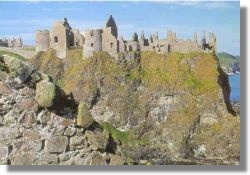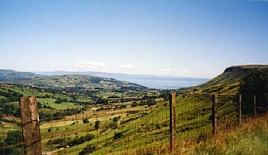Ulster
 William
Wallace stated that he came from Ireland to South Carolina in
1773. It is likely that he was born in Ireland and that his
family had lived there for generations, for most of his children and
grandchildren called themselves Irish. Presbyterian
Scots were originally introduced
into Ireland in the reign of James I (1603-1625), to settle
the estates which had been forfeited by the rebellion of several
Catholic noblemen. James thus had at his disposal nearly six counties
in Ulster, embracing half a million acres. Protestant colonies were
transplanted from England and Scotland, but chiefly from the latter,
with the intent that the principles of the Reformation should subdue
the turbulent natives.
William
Wallace stated that he came from Ireland to South Carolina in
1773. It is likely that he was born in Ireland and that his
family had lived there for generations, for most of his children and
grandchildren called themselves Irish. Presbyterian
Scots were originally introduced
into Ireland in the reign of James I (1603-1625), to settle
the estates which had been forfeited by the rebellion of several
Catholic noblemen. James thus had at his disposal nearly six counties
in Ulster, embracing half a million acres. Protestant colonies were
transplanted from England and Scotland, but chiefly from the latter,
with the intent that the principles of the Reformation should subdue
the turbulent natives.
These settlers were subsequently joined by
numbers of their countrymen, particularly under the reign of the last
Stuart kings, when numbers fled from Scotland to escape remorseless
persecution. The commotion in the Highlands of Scotland during the
civil wars swelled the number to greater proportions. The rebellions
of 1715 and 1745 added a large percentage to the increasing
population.
 Presbyterians
in Ireland were subjected to various disabilities which they felt to
be oppressive. A tenth of all their increase was vigorously exacted
for the support of ministers of the Established Church (Anglican or
Church of England), and they were precluded from various public
offices, except on terms which violated their consciences. they also
held their lands under leases of which the terms were often
oppressive. "Their position was also uncomfortable from the hostility
of the native Irish around them, most of them then in a state of rude
and almost savage barbarism, who generally adhered with tenacity to
the Church of Rome, and in whom the feelings produced by difference
of race, language and religion had by various circumstances been
nursed into the bitterest antithapy." 1
Presbyterians
in Ireland were subjected to various disabilities which they felt to
be oppressive. A tenth of all their increase was vigorously exacted
for the support of ministers of the Established Church (Anglican or
Church of England), and they were precluded from various public
offices, except on terms which violated their consciences. they also
held their lands under leases of which the terms were often
oppressive. "Their position was also uncomfortable from the hostility
of the native Irish around them, most of them then in a state of rude
and almost savage barbarism, who generally adhered with tenacity to
the Church of Rome, and in whom the feelings produced by difference
of race, language and religion had by various circumstances been
nursed into the bitterest antithapy." 1
 In
1771, the leases on the estate of the Marquis of Donegal, in
Antrim,
expired. the rents were placed at exorbitant figures. A spirit of
resentment to the oppression of the landed proprietors at once arose,
and extensive emigration was the result. "In the two years that
followed the Antrim evictions of 1772, 30,000 Protestants left
Ulster. One hundred vessels sailed for the New World loaded with
human beings. 2
In
1771, the leases on the estate of the Marquis of Donegal, in
Antrim,
expired. the rents were placed at exorbitant figures. A spirit of
resentment to the oppression of the landed proprietors at once arose,
and extensive emigration was the result. "In the two years that
followed the Antrim evictions of 1772, 30,000 Protestants left
Ulster. One hundred vessels sailed for the New World loaded with
human beings. 2
Some of these emigrants became the
"Scotch
- Irish" settlers of South
Carolina. 3
1. Patterson, Rev. George.
Pioneers of Presbyterianism in the Maritime
Provinces.
2. Mac Lean, J.P. Settlements of
Scotch Highlanders in America.
3. Norfleet, Phil. "The
Scotch Irish in Ireland and America"
 William
Wallace stated that he came from Ireland to South Carolina in
1773. It is likely that he was born in Ireland and that his
family had lived there for generations, for most of his children and
grandchildren called themselves Irish. Presbyterian
Scots were originally introduced
into Ireland in the reign of James I (1603-1625), to settle
the estates which had been forfeited by the rebellion of several
Catholic noblemen. James thus had at his disposal nearly six counties
in Ulster, embracing half a million acres. Protestant colonies were
transplanted from England and Scotland, but chiefly from the latter,
with the intent that the principles of the Reformation should subdue
the turbulent natives.
William
Wallace stated that he came from Ireland to South Carolina in
1773. It is likely that he was born in Ireland and that his
family had lived there for generations, for most of his children and
grandchildren called themselves Irish. Presbyterian
Scots were originally introduced
into Ireland in the reign of James I (1603-1625), to settle
the estates which had been forfeited by the rebellion of several
Catholic noblemen. James thus had at his disposal nearly six counties
in Ulster, embracing half a million acres. Protestant colonies were
transplanted from England and Scotland, but chiefly from the latter,
with the intent that the principles of the Reformation should subdue
the turbulent natives.  Presbyterians
in Ireland were subjected to various disabilities which they felt to
be oppressive. A tenth of all their increase was vigorously exacted
for the support of ministers of the Established Church (Anglican or
Church of England), and they were precluded from various public
offices, except on terms which violated their consciences. they also
held their lands under leases of which the terms were often
oppressive. "Their position was also uncomfortable from the hostility
of the native Irish around them, most of them then in a state of rude
and almost savage barbarism, who generally adhered with tenacity to
the Church of Rome, and in whom the feelings produced by difference
of race, language and religion had by various circumstances been
nursed into the bitterest antithapy." 1
Presbyterians
in Ireland were subjected to various disabilities which they felt to
be oppressive. A tenth of all their increase was vigorously exacted
for the support of ministers of the Established Church (Anglican or
Church of England), and they were precluded from various public
offices, except on terms which violated their consciences. they also
held their lands under leases of which the terms were often
oppressive. "Their position was also uncomfortable from the hostility
of the native Irish around them, most of them then in a state of rude
and almost savage barbarism, who generally adhered with tenacity to
the Church of Rome, and in whom the feelings produced by difference
of race, language and religion had by various circumstances been
nursed into the bitterest antithapy." 1 In
1771, the leases on the estate of the Marquis of Donegal, in
In
1771, the leases on the estate of the Marquis of Donegal, in